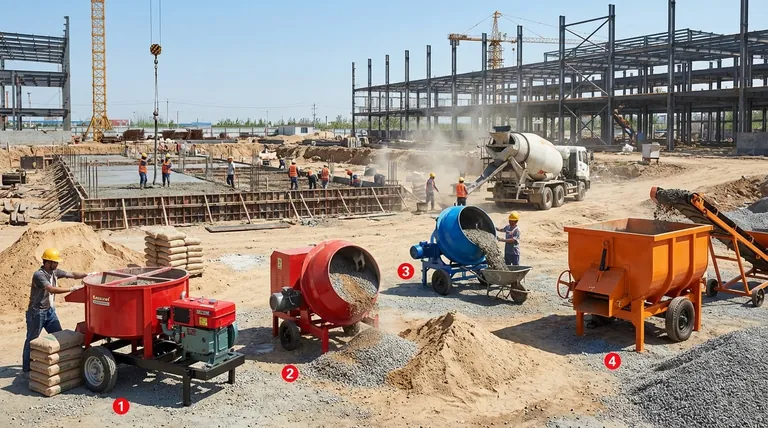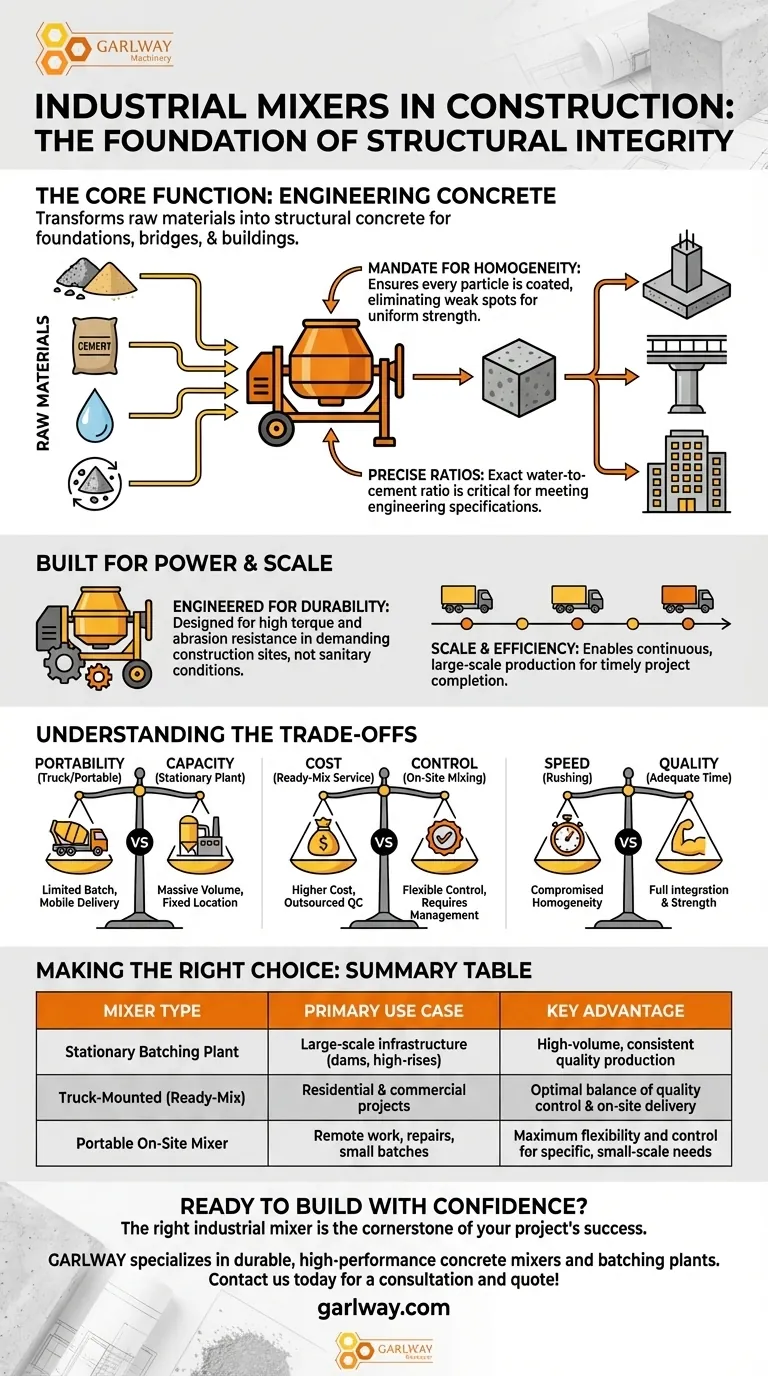In the construction industry, industrial mixers perform one foundational task: creating concrete by precisely combining cement, sand, gravel, and water. This process transforms raw materials into the single most important building material for structures like foundations, bridges, and buildings.
The essential role of an industrial mixer in construction is not merely to stir ingredients, but to engineer a homogeneous material with predictable strength and consistency. This precision is the bedrock of structural integrity and safety for modern infrastructure.

The Core Function: Engineering Structural Concrete
Industrial mixers in construction are designed for a singular, high-stakes purpose: producing concrete that meets stringent engineering specifications. The quality of the mix directly determines the strength and longevity of the final structure.
The Mandate for Homogeneity
An unevenly mixed batch of concrete contains weak spots. If aggregates are poorly distributed or the cement paste isn't uniform, the resulting material will have inconsistent density and strength, creating critical failure points within a structure.
Industrial mixers use powerful mechanical action to ensure every particle of sand and gravel is coated in cement paste, creating a completely homogeneous mixture. This uniformity is non-negotiable for structural applications.
Achieving Precise Ratios
The strength of concrete is critically dependent on the water-to-cement ratio. Industrial mixers are part of a system that allows for the addition of exact amounts of each component, guaranteeing that the final product meets the design requirements for the project.
From Raw Materials to Building Blocks
The mixer is the transition point where inert materials become a workable, structural product. Workers load precisely measured raw materials, and the mixer produces a finished product ready to be poured for foundations, columns, bridges, and countless other structural elements.
The Principle of Industrial Mixing in Construction
While the application seems straightforward, the "industrial" nature of these mixers is what makes them suitable for the demanding environment of a construction site.
Built for Power, Not Purity
Construction falls firmly in the industrial mixing category, alongside mining and chemical processing. This means the equipment is engineered for durability, high torque, and abrasion resistance, not the sterile, sanitary conditions required in the food or pharmaceutical industries.
The Impact of Scale and Efficiency
Concrete drum mixers, whether on trucks or in stationary batching plants, are designed for large-scale production. They enable the continuous and efficient creation of concrete, a necessity for keeping large construction projects on schedule.
Understanding the Trade-offs
Choosing and operating industrial mixers involves balancing competing operational needs. There is no single perfect solution for every construction scenario.
Portability vs. Capacity
Large, stationary mixers at a batching plant can produce massive volumes of high-quality concrete but cannot move. Truck-mounted mixers offer excellent portability to deliver concrete to a job site but have a limited batch capacity.
Cost vs. Control
Using a ready-mix concrete service (relying on their mixers) outsources quality control but can be more expensive and subject to delivery schedules. Mixing on-site with a portable mixer provides more control and flexibility but requires managing raw materials and quality assurance.
Speed vs. Quality
Rushing the mixing process can compromise homogeneity. An adequate mixing time is essential to ensure all components are fully integrated, and cutting this short to speed up a pour can have serious negative consequences on the concrete's final strength.
Making the Right Choice for Your Goal
The type of mixer and mixing strategy must align directly with the project's scale and requirements.
- If your primary focus is large-scale infrastructure (e.g., dams, high-rises): High-capacity stationary mixers in a central batching plant are essential for producing consistent, large volumes of concrete.
- If your primary focus is residential or small commercial work: Truck-mounted ready-mix concrete mixers provide the best balance of quality control and on-site delivery flexibility.
- If your primary focus is remote work or small repairs: Smaller, portable on-site mixers are necessary for creating specific, small batches of concrete or mortar exactly where needed.
Ultimately, mastering the use of industrial mixers is fundamental to controlling material quality and ensuring the safe, successful execution of any construction project.
Summary Table:
| Mixer Type | Primary Use Case | Key Advantage |
|---|---|---|
| Stationary Batching Plant | Large-scale infrastructure (dams, high-rises) | High-volume, consistent quality production |
| Truck-Mounted (Ready-Mix) | Residential & commercial projects | Optimal balance of quality control and on-site delivery |
| Portable On-Site Mixer | Remote work, repairs, small batches | Maximum flexibility and control for specific, small-scale needs |
Ready to build with confidence? The right industrial mixer is the cornerstone of your project's success. At GARLWAY, we specialize in durable, high-performance construction machinery, including concrete mixers and batching plants designed for contractors and construction companies worldwide. Let us help you select the perfect equipment to ensure the quality, efficiency, and structural integrity of your builds.
Contact GARLWAY today for a consultation and quote!
Visual Guide

Related Products
- Hydraulic Concrete Mixer Machine Cement Mixing Equipment for Mixture Concrete
- JZC500 Large Cement Mixer Machine Price for Concrete Mix
- Portable Concrete Mixer Machine Equipment for Mixing Concrete
- Construction Products Concrete Plant Machine Mixing Concrete Mixer
- HZS25 Best Cement Mixer for Quick Mix Concrete at Bunnings
People Also Ask
- How did volumetric mixer technology evolve from the 1960s to present? From Manual to Digital Precision
- What safety features are included in the electrical control system of a twin-shaft forced concrete mixer? Ensure Operator and Equipment Protection
- What is a concrete mixer and what are its components? A Complete Guide to Efficient Mixing
- Why is volumetric concrete considered an innovative solution for construction? Unlock On-Site Control & Efficiency
- How does a volumetric concrete mixer work? On-Demand Concrete for Zero Waste & Maximum Flexibility
- How does project scale affect mixer selection? Match Your Project's Volume, Speed, and Logistics
- What are the differences between steel and polyethylene mixing drums? Boost Your Mixer's Lifespan & Efficiency
- What are the structural types of forced mixers? Choose the Right Mixer for Your Concrete Plant



















